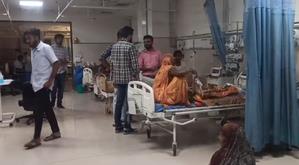
Know What Is Chandipura Virus That Claimed Lives Of 6 Children In Gujarat
According to Gujarat health Minister Rushikesh Patel, the virus is suspected to have caused the death of six children in the past five days, while the number of cases has risen to 12 -- from Gujarat (9), Rajasthan (2) and Madhya Pradesh (1).
All patients received treatment in Gujarat, said Patel, adding that all 12 samples have been sent to the National Institute of Virology (NIV), Pune for verification.
What is the Chandipura virus?
Chandipura virus is a type of arbovirus that is a member of the vesicular virus genus of the Rhabdoviridae family. It is transmitted primarily through phlebotomine sandflies and sometimes through ticks and mosquitoes.
Children are more prone to getting infected with this virus, health experts said.
“Chandipura virus is an emerging pathogen that has garnered significant attention in recent years due to its potential to cause severe and often fatal illnesses in humans, particularly in children,” Dr Neha Rastogi Panda, Consultant, Infectious Disease, Fortis Memorial Research Institute, Gurugram, told IANS.
First identified in India in 1965, the virus is named after the Chandipura village in Maharashtra where it was initially isolated.
“Its symptoms include sudden onset of high-grade fever, diarrhoea, vomiting, seizures, altered sensorium which can ultimately lead to death within 24 to 72 hours of the onset of the symptoms,” Dr. Shreya Dubey, Consultant - Neonatology and Paediatric, CK Birla Hospital, Gurugram, told IANS.
The virus's epidemiology is not fully understood, but outbreaks have been reported mainly in India, with sporadic cases in other regions.
“It poses a significant public health challenge due to its rapid transmission and the high mortality rate associated with infections,” said Dr Panda.
Early detection key
Currently, there are no specific antiviral treatments or vaccines against the Chandipura virus.
The disease course is rapidly progressive and has a high case fatality rate, said the experts, calling for early detection and treatment.
“The clinical presentation of Chandipura virus infection can be severe and sudden. Symptoms typically begin with high fever, headaches, vomiting, and altered mental status, quickly progressing to seizures and encephalitis,” Dr Panda said.
“As soon as someone notices any symptoms, they should visit the emergency or seek medical attention as early as possible,” added Dr Dubey.
Public health strategies
Insecticide sprays can help eliminate the vector, said the experts, while also calling for efforts to prevent the spread of the virus by controlling sandfly populations.
“Public health strategies include the use of insect repellents, bed nets, and insecticides, as well as raising awareness about the risks and symptoms of the disease,” said Dr Panda.
She also stressed the need for increasing research to better understand the virus's transmission dynamics.
“It will also help develop effective treatments and create vaccines. Increased surveillance and reporting can help in early detection and containment of outbreaks, ultimately reducing the impact of this deadly virus on affected populations,” the doctor said.

Legal Disclaimer:
MENAFN provides the information “as is” without warranty of any kind. We do not accept any responsibility or liability for the accuracy, content, images, videos, licenses, completeness, legality, or reliability of the information contained in this article. If you have any complaints or copyright issues related to this article, kindly contact the provider above.
Most popular stories
Market Research

- Manuka Honey Market Report 2024, Industry Growth, Size, Share, Top Compan...
- Modular Kitchen Market 2024, Industry Growth, Share, Size, Key Players An...
- Acrylamide Production Cost Analysis Report: A Comprehensive Assessment Of...
- Fish Sauce Market 2024, Industry Trends, Growth, Demand And Analysis Repo...
- Australia Foreign Exchange Market Size, Growth, Industry Demand And Forec...
- Cold Pressed Oil Market Trends 2024, Leading Companies Share, Size And Fo...
- Pasta Sauce Market 2024, Industry Growth, Share, Size, Key Players Analys...






















Comments
No comment